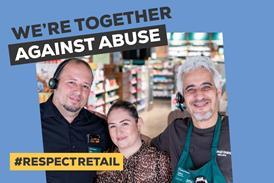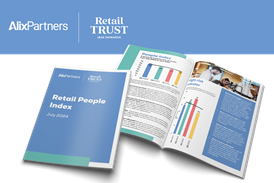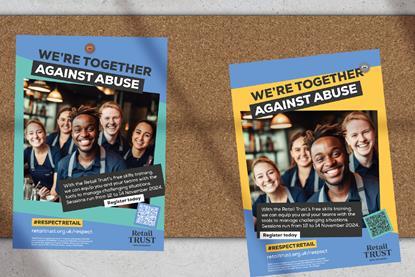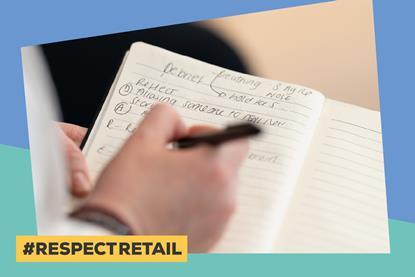Respect retail and stand together against abuse
How training can future-proof your wellbeing
As our latest poll reveals a third of shop workers face abuse every week, the Retail Trust’s dedicated training can help colleagues feel safer.
“The customer lunged to headbutt me… I moved store after that because I had a nervous breakdown,” Colin, a fortysomething former store manager told the Retail Trust recently. After a lifetime working in retail, a job he says he loved for the committed teams he worked with and the wonderful customers he supported, he has now quit the sector altogether after experiencing PTSD. “I left retail eventually, because I started taking customer abuse too personally and would go home and burst into tears.”
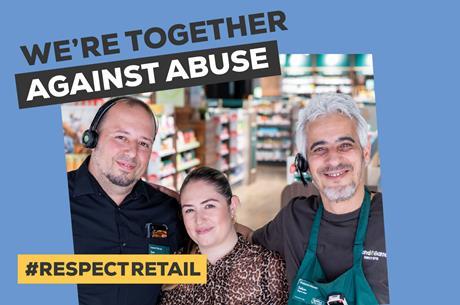
It is an all-too-familiar story that 80% of shop workers and 90% of store managers who have experienced customer abuse will relate to. Like Colin, of those experiencing abuse, 98% say they have been verbally abused and threatened with violence, and another 14% admit they’ve been physically assaulted. As a result, more than a third of retail workers are considering quitting their job.
But while the situation appears bleak, a number of positive initiatives are rising up within retail organisations to tackle the issue. And for many, it’s working.
Matt is a general manager at a high street clothing retailer who believes that taking immediate action is the best way to help teams feel supported. “We had two or three incidents where managers were assaulted so we immediately fed back to head office and put new measures in place,” explains Matt. “We have de-escalation training on how to deal with threatening customers and advice on tone of voice and body language for junior managers, to help them feel mentally prepared. We hold regular wellbeing meetings with the team and look at what we can put in place to support them, such as increasing guard coverage and enlisting an external security company. The debrief is vital so if something happens today, we talk about it as a team the next morning. Things have improved in the last six months.”
Recent research from the Retail Trust encouragingly reports that nearly a third of shop workers say their employer has introduced training in the last year to help them deal with levels of abuse. However many haven’t. A worrying third of respondents haven’t received any training at all and the rest would like more. It is this urgent need – and plea for help from frontline workers – that inspired the launch of the Retail Trust’s free skills training on managing challenging situations in November.
The campaign is supported by Foot Anstey, Maze, Peoplesafe, Usdaw, the British Retail Consortium, the Institute for Customer Services, and our media partner Retail Week. It is also backed by major retail companies including American Golf, bp, Brewers Decorator Centres, DHL, Dune London, EE, FatFace, Frasers Group, Go Outdoors, H&M, Holland & Barrett, Landsec, Primark, Schuh, The Entertainer, Theo Paphitis Retail Group and TJX Europe, TK Maxx and Homesense.
Help is here
Whether you work in an independent shop or chain, our psychological and emotional safety training will teach you valuable skills for managing challenging situations. The more people who share their experiences and talk about customer abuse, the more awareness is raised around the issue and, importantly, the more people can access training and support.
“There is definitely some cause for optimism now that people are becoming more aware of abuse,” says Andrea Woodside, wellbeing training lead at the Retail Trust. “They’re talking about it more and they’re more likely to raise their hands to employers to say they’re struggling. Nobody goes to work to be abused, and in our training sessions we’re keen to take this two-pronged approach – build confidence and build competence. The other thing about training is it helps people recognise that they’re not on their own.”
What’s our training like?
Our training will give you strategies to manage customers, using simple, easy-to-implement techniques, as Jonny, a store manager, describes, “I loved the whole thing – the information about understanding how our bodies react in a certain way, how we should not mimic aggression even when our mind is telling us to. And the breathing exercises should be shared with all retailers.”
It is a sentiment shared with other colleagues: “It was interesting that regardless of what type of retail you are in, premium or value, we are tackling the same issues. I’ve taken loads of notes, so I can feed back to my support network and build on what I have learned,” says Ellen, store manager.
“By the end of the session we agreed it would be really beneficial for senior teams in our stores to be trained to support our teams and colleagues in how to deal with these issues and make them feel safer,” adds Asif, store manager. “When I get back to my teams, I’m now considering how I make it easier for them to debrief at the end of each shift.”
Reassuringly, the majority (60%) of those working for the UK’s biggest retailers say there is enough training. But there’s a gap in support that disproportionately affects independent retailers and the three quarters of shop staff who told us they feel vulnerable because they haven’t received any support from bosses.
Angela is a sales assistant at a clothing retailer in County Down: “I have been in management conference calls and nobody speaks up because they’re afraid of losing their job. I think having a service that allows colleagues to feel comfortable about speaking up would help.” It’s something that makes a huge difference to those who do feel supported.”
As lead trainer Andrea says, “Whilst customer abuse is a common experience, people can feel very isolated if being abused. Our training is about raising awareness, allowing people to have a voice, to know that they’re not alone and give them a renewed confidence and sense of achievement by leaving training knowing they have an action plan.”
First-hand accounts from retail colleagues
“Training reminds you to check-in with teams”
Johnny, store manager, London
“Retail workers’ voices need to be heard”
Tony, store manager, Essex
“Training helps colleagues feel safer”
Asif, clothing store manager, London
“I wish I’d had training back in the day”
Sofiia, store supervisor, London
“What I learnt will make my workplace safer”
Ellen, store manager, Kent
“I am fortunate that my employer doesn’t tolerate abuse”
Stephanie, 41, works for an independent retailer, Conwy
“By taking immediate action, the team feels supported”
Matt, 40, general manager, West Midlands
“I left retail when it all got too much”
Colin, 49, former assistant store manager, Brighton
“Don’t push through when you’re upset”
Kat, 27, various retail roles, Southampton
“I’m a human being too”
Priscilla, 32, store manager, London
“People are too afraid to speak up”
Angela, 53, sales assistant at a clothing retailer, County Down
“Together we can make a difference”
Darsh, director of stores for a retail chain
“It needs to be taken more seriously”
Megan, 22, former supermarket sales assistant, Cheshire
“It can often feel like being an emotional punchbag”
Sunita, 42, a make-up artist and beauty counter representative, Derby
Resources
Resources to respect retail and stand together against abuse
Resources to show your support.
Three ways to prepare colleagues when faced with customer abuse
How to equip our people against the biggest challenge the industry faces.
Training course: psychological and emotional safety
This course gives participants the skills to be able to better cope with the increasing number of challenging situations that take place in-store, and how to maintain the physical and emotional safety of frontline colleagues.
Take five: how to stay safe in store
Verbal abuse from customers can be frightening and stressful. Cliff Lee, director of wellbeing services at the Retail Trust, explains how to stay safe and look out for your colleagues.
Seven ways to stay safe in store
As the Retail Trust launches respect retail, our campaign to tackle the intolerance epidemic and protect retail workers from abusive customers, here’s how colleagues can stay safe.
How to stay safe when facing customer abuse
Whether you’re a manager or a retail worker, knowing how to respond when encountering an abusive customer could help to keep yourself, your colleagues and your customers safer.

